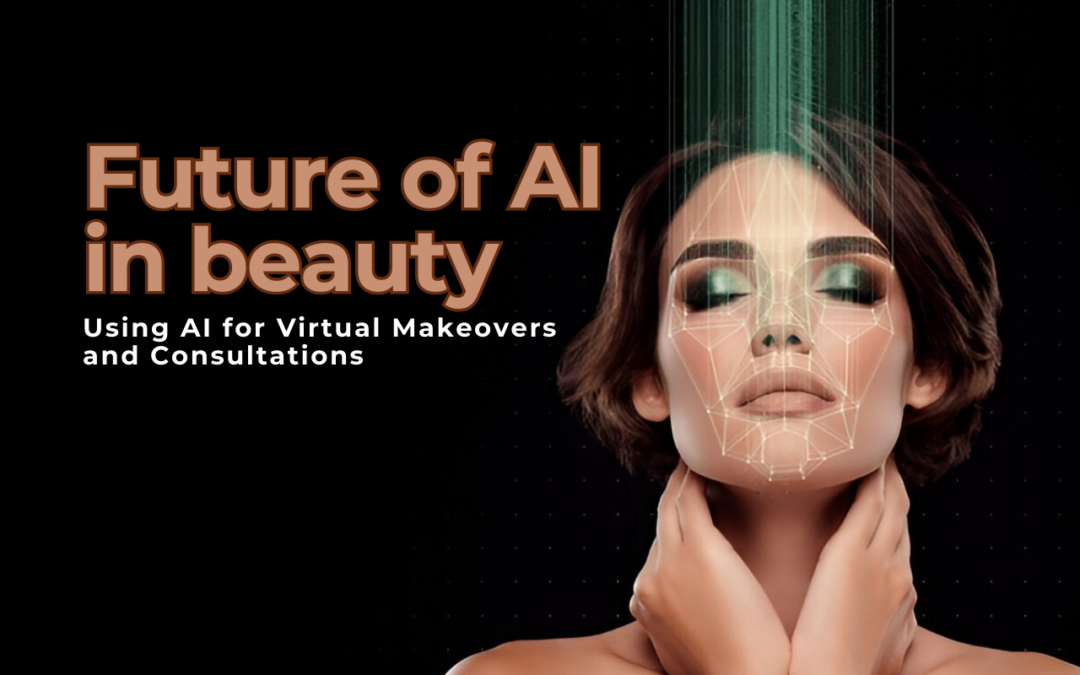The beauty industry is undergoing a transformative revolution, driven by the integration of Artificial Intelligence (AI). As technology evolves, virtual makeovers and AI-powered consultations are becoming the norm, offering personalized beauty experiences like never before. This blog explores how AI is reshaping the beauty landscape, its benefits, and what the future holds for both consumers and brands.
1. The Rise of AI in Beauty
AI in beauty is not just a trend; it’s a game-changer. From advanced skin analysis tools to virtual try-on apps, AI technologies help consumers make informed decisions without setting foot in a store. Leading brands like L’Oréal, Sephora, and Estée Lauder have already adopted AI-driven solutions to enhance customer engagement and satisfaction. AI algorithms analyze vast amounts of data, including skin types, user preferences, and current beauty trends, to offer highly accurate recommendations. This shift is not only enhancing the consumer experience but also revolutionizing how brands approach product development, marketing strategies, and customer retention.
2. How Virtual Makeovers Work
Virtual makeover tools use augmented reality (AR) combined with AI algorithms to simulate makeup application, hair color changes, and even skincare effects in real-time. These tools analyze facial features, skin tone, and texture to provide realistic previews of products. Apps like YouCam Makeup and ModiFace allow users to experiment with different looks, helping them find the perfect match before making a purchase. The technology leverages facial recognition and machine learning to improve accuracy over time, adapting to new user inputs and evolving beauty trends. Users can adjust lighting, angles, and other factors to see how products perform under various conditions, creating a comprehensive and interactive beauty trial experience.
3. Personalized Beauty Consultations
AI-driven beauty consultations go beyond virtual try-ons. AI can assess skin conditions, recommend products based on individual needs, and even create customized skincare routines. Chatbots and virtual beauty advisors are available 24/7, offering expert advice and product suggestions tailored to each user’s unique profile. Some platforms integrate AI with dermatological data, enabling advanced skin diagnostics that identify issues like dehydration, hyperpigmentation, and fine lines. Additionally, AI-powered tools can track a user’s skincare journey over time, providing insights into product efficacy and suggesting adjustments as needed. This level of personalization helps build trust and loyalty between brands and consumers.
4. Benefits of AI in Beauty
- Convenience: Try new looks from the comfort of your home, eliminating the need for physical store visits.
- Personalization: Receive tailored recommendations based on your specific skin type, preferences, and beauty goals.
- Cost-Effective: Avoid buying products that don’t suit you, reducing waste and saving money.
- Inclusivity: AI tools cater to diverse skin tones, hair textures, and beauty standards, promoting inclusivity in the beauty industry.
- Enhanced Confidence: By providing accurate previews and recommendations, AI tools help users feel more confident in their beauty choices.
- Data-Driven Insights: For brands, AI offers valuable consumer insights that can drive product innovation and marketing strategies.
5. Challenges and Considerations
While AI offers numerous benefits, there are challenges to consider:
- Privacy Concerns: Collecting and storing biometric data raises privacy issues. Brands must ensure robust data protection measures and transparent privacy policies.
- Accuracy: AI algorithms are constantly evolving, and occasional inaccuracies can occur, especially with diverse facial features and skin tones.
- Digital Divide: Not everyone has access to the technology required for AI-powered beauty solutions, potentially creating a gap between different consumer segments.
- Over-Reliance on Technology: While AI can enhance beauty experiences, it cannot completely replace human expertise. A balanced approach is essential.
6. The Future of AI in Beauty
The future of AI in beauty looks promising. We can expect more sophisticated AI tools capable of providing holistic beauty solutions, from personalized fragrance recommendations to mental wellness insights based on skin health. Emerging technologies like 3D printing, combined with AI, may enable the creation of custom beauty products tailored to individual needs. Additionally, advancements in voice recognition and natural language processing could lead to more intuitive virtual beauty assistants. As technology advances, the line between virtual and real beauty experiences will continue to blur, creating an immersive, personalized, and inclusive beauty ecosystem. Brands will likely integrate AI with other technologies, such as the Internet of Things (IoT) and wearable devices, to offer comprehensive beauty and wellness solutions.
Conclusion
AI is not just shaping the future of beauty; it’s redefining it. Virtual makeovers and AI-powered consultations are making beauty more accessible, personalized, and efficient. As brands continue to innovate, consumers can look forward to an exciting era where beauty and technology go hand in hand. The future holds endless possibilities, from AI-driven skincare diagnostics to virtual reality beauty experiences, ensuring that beauty remains a dynamic and evolving industry that caters to the diverse needs of individuals worldwide.












